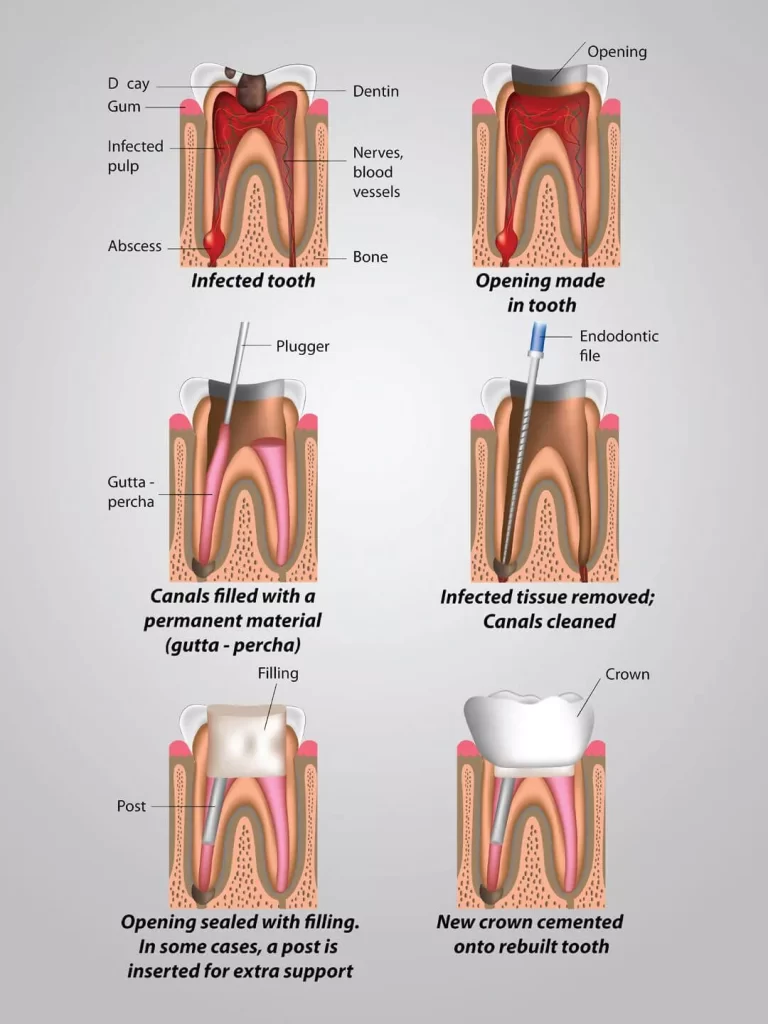- About us
- Dental Problems
Teeth & Gums
Cosmetic Improvement
Common Issues
- Treatments
Dental Services
Cosmetic Dental Services
Dental Specialists
- Before & After
- Patient Safety
- Contact
- Blog
-
Clinic Timing
12:00pm to 9:00pm
- About us
- Dental Problems
Teeth & Gums
Cosmetic Improvement
Common Issues
- Treatments
Dental Services
Cosmetic Dental Services
Dental Specialists
- Before & After
- Patient Safety
- Contact
- Blog
Treatments
Root Canals
Are you apprehensive about undergoing a root canal procedure? Fear not, as millions of teeth are saved each year thanks to this treatment. Root canals are transformative, as they enable dentists and endodontists to preserve millions of teeth from being extracted annually.
The purpose of a root canal also referred to as endodontic treatment, is to rescue a tooth that has been severely damaged due to decay, disease, or injury. By means of root canal treatment, patients are able to retain their natural teeth instead of having them extracted. Natural teeth are superior to artificial teeth since they are stronger and more effective for biting and chewing. Our dentists and specialists are highly skilled in providing you with the best root canal treatment available.
What Is It?
Every tooth has a little canal inside it called a root canal. People endure toothaches or develop an abscess if the dental pulp deteriorates or becomes infected. To save the tooth, root canal therapy is used.
Pulp illness can occur for a variety of reasons, including the following:
- Decay Trauma
- Deep craters
- Severe wear
- Fracture of the tooth or a crack in the tooth
As soon as a problem is discovered, root canal therapy should begin to increase the likelihood of success. To access the root canal for root canal therapy, a hole is drilled through the crown of the tooth. The empty canal is then cleaned and the diseased pulp is subsequently removed. The canal is next cleaned with a sterilizing solution, shaped with fine dental tools, and sealed with a final filling.
The duration of this treatment may span multiple visits. Antibiotics may be recommended if an infection is present. The tooth’s final restoration plays a crucial role. Bacteria can enter the tooth again if the restoration isn’t done correctly, leading to another infection. In order to properly reinforce and seal the tooth, a crown may occasionally be advised. Depending on the difficulty, a dentist or occasionally an endodontic performs root canal therapy.

Need To Know
Appointments
- Root canals will usually take several visits to complete
- At the first consultation visit the dentist will take x-rays and examine your teeth and mouth
- They will then save the tooth by removing the infected pulp
- At the next visit the dentist will complete the final restoration or fitting of a crown
- Further appointments may be needed if you have any problems or issues
Before your appointment
- No special preparation needed
How long it takes
- The consultation will usually take around 30 to 45 minutes
- The root canal procedure is often done in 1 to 2 appointments that usually take around 90 minutes each
- The fitting of a crown will usually take around 30 minutes
After your appointment
- You can continue to brush your teeth as normal
- Avoid eating chewy or hard foods for the first few days
- Take care when flossing daily
- Reduce the amount of sugary food and drink you consume
You may be asked about
- Your dental history and medical history
- The pain and symptoms you are experiencing
Quick tip
- The more you rest and take care of your oral health after treatment the faster you will recover.
FAQs
01. How much does a root canal treatment cost?
Root canals often require several visits to complete. The price will vary depending on the condition of your tooth and how many visits you will need to complete the treatment. Once you’ve been examined by the dentist they will be able to give you an approximate cost for the treatment.
02. Can root canals be avoided?
Taking good care of your oral health will help avoid any future problems from occurring. Brushing twice daily and flossing daily are easy ways you can prevent decay. Regular visits to the dentist will not only prevent the need for root canals, it will also help discover any problems in your teeth before they become too big.
03. Is it painful getting a root canal?
Our dentists are experts and making you feel comfortable while taking care of your oral health is a high priority. There’s no need to feel anxious or stressed. Root canals are performed to stop the pain people experience from the infection and to save the damaged tooth. Dentists will normally use a local anaesthetic to numb the tooth and the area around it to make it more comfortable for patients. Once the procedure is completed you may feel some sensitivity and discomfort but this will fade over a couple of days.
04. How successful is root canal treatment?
Like all dental and medical treatments, root canal treatment has risks. Because the root canals are very fine and curved in some teeth, it may be difficult to clean the canals completely. In that case your dentist might not be able to guarantee that the procedure will be successful. Success can depend on your general health, age, capacity to heal, and many other factors.
The final restoration of the tooth is also important to prevent another infection from occurring. Infection in your damaged tooth is likely to heal completely once you’ve had root canal treatment. The risks of reinfection are low, but if infection recurs the tooth may have to be treated again, and sometimes removed.
In some people, the treated tooth may lose its original colour and become darker. If a front tooth is affected the discolouration can be treated by bleaching, or an artificial crown or veneer can be fitted. Pain or infection can sometimes occur months or years after a tooth has been treated. This is usually due to further deep decay, trauma or a cracked filling which allows bacteria to enter the tooth and cause infection. More endodontic treatment may be needed to save the tooth.
05. What are the signs that a root canal is needed?
Pain is the most common symptom people experience when they need root canal treatment. You might also feel sensitivity to hot or cold, tooth discolouration, and swelling or soreness in the gums surrounding the tooth. Only your dentist or specialist will be able to tell if you need a root canal, so if you have any pain or sensitivity of your teeth you should visit a dentist as soon as you can.
Make sure you select emergency when you book online, or simply call us for an urgent appointment.

